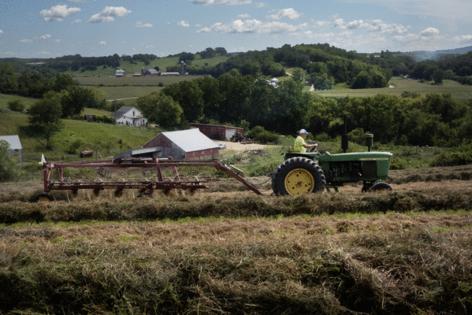Commentary: The real threat to food security
Published in Op Eds
Like many other farm families, my family rents out some of our land to help pay the bills. Usually, when this happens, we can rest assured about two things: first, that someone will rent from us; and second, they will pay more year after year.
Farmland rents have risen steadily over the years, increasing 3.2% per acre over the last year alone. But that pales in comparison to the rising cost of buying land. From 2010 to 2024, the U.S. Department of Agriculture (USDA) recently reported, the price of cropland shot up 106%, while the cost of pasture land rose by 73%. These upward trends make getting into farming nearly impossible for the next generation.
According to a 2022 survey by the National Young Farmers Coalition, land access is the number one challenge facing people who want to enter the agriculture field. Accordingly, improving land access should be a policy priority for lawmakers concerned with strengthening national food security. Towards this goal, some pro-farmer measures could become part of the farm bill slated to be on the new Congress’ agenda for next year. Such proposals aim to keep land in producers’ hands and bolster local farm economies.
We often hear about how actors associated with Chinese interests are gobbling up our farmland. In September, the House of Representatives, with bipartisan support, passed a bill to prohibit land purchases by people from China, Russia, North Korea and Iran; it has already found its way into the House version of the farm bill that will be taken up next year. The America First Policy Institute (AFPI), where Trump’s pick to head up the USDA, Brooke Rollins, was CEO, has supported this legislation.
But in fact, when it comes to farmland ownership problems, foreign purchases are largely a red herring — a distraction from more serious threats.
For starters, none of the countries targeted in the House bill are major players in U.S. land markets. The number-one foreign owner of farmland, accounting for about a third of the total, is Canada, according to a 2022 USDA report, followed by the Netherlands and then Italy. China ranks 19th in terms of acreage, while Iranian investors hold only a few thousand acres and Russian interests hold just dozens.
Meanwhile, non-farmer individuals, investment funds and corporations are increasingly snatching up farmland. Nearly 40% of farmland is held by such actors, with their acquisitions increasing 231% since 2008. The United States is now importing more food than ever, with 60% of the fruits and 40% of the vegetables we consume coming from other countries.
Food security is national security, as a nation that forfeits its ability to feed itself becomes vulnerable to the policies and interests of others. Trump, Rollins and the Republicans, like everyone else, are right to be concerned about farmland loss. If so, they should support creating opportunities for those seeking to become our next generation of farmers by making key pro-farmer legislation part of the farm bill.
One such bill that would advance this interest is the Farmland for Farmers Act, which seeks to prohibit financial speculators and non-farmer corporations from purchasing farmland. While such non-farmer interests are not the only driver of rising values, removing their deep pockets from competition over land would tip the scales in favor of beginning producers.
There is also the Increasing Land Access, Security and Opportunities Act, introduced in the House and Senate earlier this year and certain to be reintroduced in the next legislative session. The bills provide financial assistance for farmers and ranchers to acquire land by covering closing costs and down payments, offering resources to facilitate farmland transitions across generations and creating a stakeholder committee to evaluate applications and distribute funds.
My family knows the importance of keeping land in the hands of local farmers. We encourage our lawmakers in the next Congress to get serious about issues concerning land access and to hold the same values instead of giving into corporate interests. Let’s make our next farm bill work more for the health of our farm system, and less for Wall Street.
____
Anthony Pahnke (anthonypahnke.com) is vice president of Family Farm Defenders and an associate professor of international relations at San Francisco State University in San Francisco. This column was produced for Progressive Perspectives, a project of The Progressive magazine, and distributed by Tribune News Service.
___
©2024 Tribune Content Agency, LLC.




























































Comments